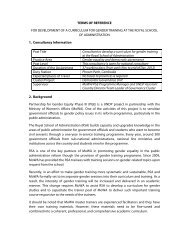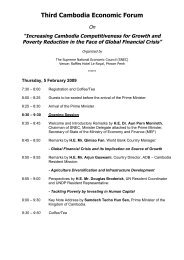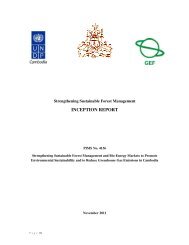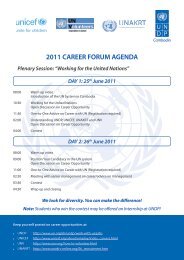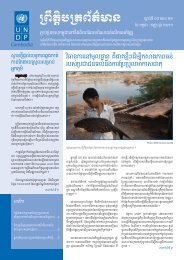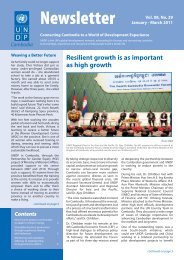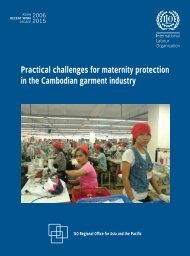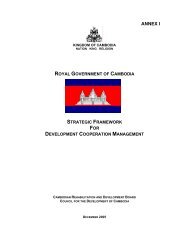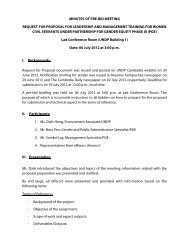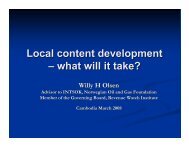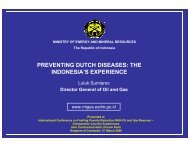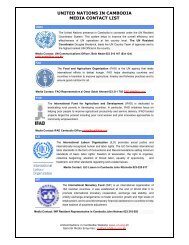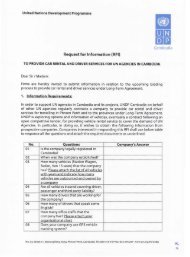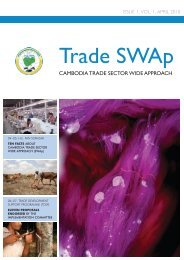UN Analysis Final.pdf - United Nations in Cambodia
UN Analysis Final.pdf - United Nations in Cambodia
UN Analysis Final.pdf - United Nations in Cambodia
You also want an ePaper? Increase the reach of your titles
YUMPU automatically turns print PDFs into web optimized ePapers that Google loves.
25 give part or all of their time to activities that benefit their communities. Mysliwiec (2005) noted a similar<br />
pattern, f<strong>in</strong>d<strong>in</strong>g that about a third of 215 young respondents to her study had some volunteer experience of<br />
community work, NGOs, or <strong>in</strong> private and public sectors, youth associations or <strong>in</strong>ternational organizations.<br />
In 2002, Wallquist found that there were some 50-60 youth-<strong>in</strong>itiated organisztions <strong>in</strong> the country whose<br />
activities ranged from the promotion of good citizenship to br<strong>in</strong>g<strong>in</strong>g about social change.<br />
The lack of recognition of youth needs and perspectives <strong>in</strong> the Government’s policies and programmes<br />
appears to stem from several factors, <strong>in</strong>clud<strong>in</strong>g the hierarchical nature of <strong>Cambodia</strong>n society, which demands<br />
respect for elders and authorities and limits possibilities for young people to articulate their views (Yong 2005).<br />
Along with this ‘age hierarchy’ comes a ‘knowledge hierarchy’ (Brown 2008), whereby leaders and older people<br />
th<strong>in</strong>k that youths are <strong>in</strong>experienced and that they should listen to the more mature and experienced members<br />
of the community (Yong 2005). This study’s FGD f<strong>in</strong>d<strong>in</strong>gs confirm these observations as young <strong>in</strong>terviewees<br />
expressed their exclusion from or limited <strong>in</strong>volvement <strong>in</strong> development activities.<br />
Village local authorities never allowed us to participate and express our op<strong>in</strong>ion and ideas <strong>in</strong> any village<br />
meet<strong>in</strong>g... – FGD, 15-19 year old males, Sihanoukville<br />
“Angkar” conducts agricultural tra<strong>in</strong><strong>in</strong>gs <strong>in</strong> the village. The youth were not allowed to participate <strong>in</strong> these<br />
tra<strong>in</strong><strong>in</strong>gs because the elders believe that they will not absorb what is be<strong>in</strong>g taught... – FGD, 15-19 year old<br />
females, Ratanakiri<br />
The lack of support and encouragement from parents and communities for youth civic engagement also<br />
partly expla<strong>in</strong>s the absence of youth needs and perspectives <strong>in</strong> government policies and programmes.<br />
Parents apparently perceive such engagement as political <strong>in</strong> nature, and therefore entail<strong>in</strong>g risk (KYA 2008).<br />
Qualitative <strong>in</strong>formation gathered for this study also found that <strong>Cambodia</strong>’s education system has failed to<br />
impart the knowledge and values necessary for the development of skills among young people that would<br />
help them build and participate <strong>in</strong> modern democratic societies, thereby ensur<strong>in</strong>g good governance. As one<br />
FDG participant noted:<br />
We realise that the contribution of youth to our community development is very important…be<strong>in</strong>g able to<br />
express our ideas could help us improve our capacity and know more about development, sometimes<br />
we have some good ideas but do not have good opportunities to express them so we keep them <strong>in</strong> our m<strong>in</strong>ds<br />
– FGD, female youth, Siem Reap<br />
There are <strong>in</strong>dications that young people have a sense of civic responsibility, albeit at a fairly basic level<br />
(Mysliwiec 2005). Asked what they could do as students to contribute to <strong>Cambodia</strong>’s development,<br />
respondents from Phnom Penh swa their roles as: “do<strong>in</strong>g their best <strong>in</strong> their studies; shar<strong>in</strong>g knowledge<br />
and <strong>in</strong>formation from their studies with relatives and ‘others’; be<strong>in</strong>g a good citizen; conservation of the<br />
environment and of culture, engag<strong>in</strong>g <strong>in</strong> social works; ‘rais<strong>in</strong>g criticisms <strong>in</strong> order to reform bad practices’;<br />
engag<strong>in</strong>g <strong>in</strong> volunteer work; and go<strong>in</strong>g after tra<strong>in</strong><strong>in</strong>g opportunities” (Mysliwiec 2005). There is an apparent<br />
need for <strong>Cambodia</strong>’s educational system and other traditional <strong>in</strong>stitutions (e.g., family, peer groups, community<br />
<strong>in</strong>stitutions such as the pagoda) to help <strong>in</strong>stil the value of civic responsibility among young people.<br />
Situation <strong>Analysis</strong> of Youth <strong>in</strong> <strong>Cambodia</strong><br />
91



